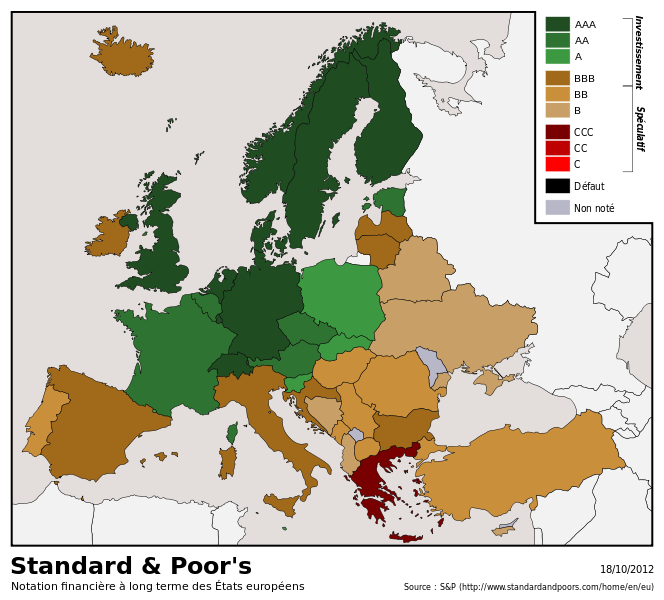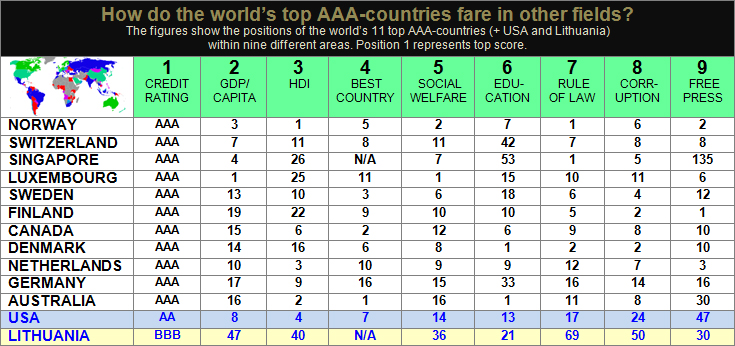
THE VOICE OF INTERNATIONAL LITHUANIA
|
VilNews has its own Google archive! Type a word in the above search box to find any article.
You can also follow us on Facebook. We have two different pages. Click to open and join.
|

By Aage Myhre, Editor-in-Chief
Lithuania has powerful neighbours, as the overwhelming majority of the world's countries with AAA credit rating are located in Scandinavia and Western Europe. These countries, however, are successful in many different ways, not least with regard to social welfare, health care, education, rule of law, transparency, press freedom and a very good balance between government, business, education, science, and more.
The table below tells an interesting story about the relationship between these qualities for a group of nations that lead in world development. These tremendous success stories is something Lithuania should try to learn from.

1. Credit rating, Standard & Poor’s
A credit rating evaluates the credit worthiness of a debtor, especially a business (company) or a government. It is an evaluation made by a credit rating agency of the debtor's ability to pay back the debt and the likelihood of default. Credit ratings are determined by credit ratings agencies. The credit rating represents the credit rating agency's evaluation of qualitative and quantitative information for a company or government; including non-public information obtained by the credit rating agencies analysts.
http://en.wikipedia.org/wiki/Credit_rating
2. GDP (PPP) per capita
Gross domestic product (GDP) estimates are derived from purchasing power parity (PPP) calculations, per capita. Such calculations are prepared by various organizations, including the International Monetary Fund and the World Bank.
http://en.wikipedia.org/wiki/List_of_countries_by_GDP_(PPP)_per_capita
3. Human Development Index (HDI), UN
The Human Development Index (HDI) is a composite statistic of life expectancy, education, and income indices to rank countries into four tiers of human development. It was created by economist Mahbub ul Haq, followed by economist Amartya Sen in 1990, and published by the United Nations Development Programme.
http://en.wikipedia.org/wiki/Human_Development_Index
4. Best country to live in, OECD
OECD has a whole new way to rank quality of life in countries around the world. Called "The Better Life Index," the new OECD data set ranks countries based on things like the employment situation, leisure time, and life expectancy.
http://www.businessinsider.com/oecd-better-life-index-2011-5?op=1
5. Social welfare
A welfare state is a "concept of government in which the state plays a key role in the protection and promotion of the economic and social well-being of its citizens. It is based on the principles of equality of opportunity, equitable distribution of wealth, and public responsibility for those unable to avail themselves of the minimal provisions for a good life. Modern welfare states include the Nordic countries, such as Iceland, Sweden, Norway, Denmark, and Finland which employ a system known as the Nordic model. The welfare state involves a transfer of funds from the state, to the services provided (i.e. healthcare, education) as well as directly to individuals ("benefits"). The welfare state is funded through redistributionist taxation and is often referred to as a type of "mixed economy.”
http://en.wikipedia.org/wiki/Welfare_state
6. Education
The United Nations publishes a Human Development Index every year, which consists of the Education index, GDP Index and Life Expectancy Index. These three components measure the educational attainment, GDP per capita and life expectancy respectively. The Education Index is measured by the adult literacy rate (with two-thirds weighting) and the combined primary, secondary, and tertiary gross enrollment ratio (with one-third weighting). The adult literacy rate gives an indication of the ability to reading and writing, while the GER gives an indication of the level of education from nursery (UK & others)/kindergarten (USA & others) to post-graduate education. Education is a major component of well-being and is used in the measure of economic development and quality of life, which is a key factor determining whether a country is a developed, developing, or underdeveloped country.
http://en.wikipedia.org/wiki/Education_Index
7. Rule of Law
The WJP Rule of Law Index is an innovative quantitative assessment tool designed by the World Justice Project to offer a detailed and comprehensive picture of the extent to which countries adhere to the rule of law in practice. The Index provides detailed information and original data regarding a variety of dimensions of the rule of law, which enables stakeholders to assess a nation’s adherence to the rule of law in practice, identify a nation’s strengths and weaknesses in comparison to similarly situated countries, and track changes over time.
http://www.nationsencyclopedia.com/WorldStats/WGI-rule-law-percentile-rank.html
8. Corruption, Transparency International
The Corruption Perceptions Index ranks countries/territories based on how corrupt their public sector is perceived to be. A country/territory’s score indicates the perceived level of public sector corruption on a scale of 0 - 10, where 0 means that a country is perceived as highly corrupt and 10 means that a country is perceived as very clean. A country's rank indicates its position relative to the other countries/territories included in the index.
http://cpi.transparency.org/cpi2011/results/
9. Press freedom
The Press Freedom Index is an annual ranking of countries compiled and published by Reporters Without Borders based upon the organization's assessment of the countries' press freedom records in the previous year. A smaller score in the index corresponds to greater freedom of the press. Reporters Without Borders is careful to note that the index only deals with press freedom and does not measure the quality of journalism.
http://en.wikipedia.org/wiki/Press_Freedom_Index
- Bookmark :
- Digg
- del.icio.us
- Stumbleupon
- Redit it
VilNews e-magazine is published in Vilnius, Lithuania. Editor-in-Chief: Mr. Aage Myhre. Inquires to the editors: editor@VilNews.com.
Code of Ethics: See Section 2 – about VilNews. VilNews is not responsible for content on external links/web pages.
HOW TO ADVERTISE IN VILNEWS.
All content is copyrighted © 2011. UAB ‘VilNews’.

 Click on the buttons to open and read each of VilNews' 18 sub-sections
Click on the buttons to open and read each of VilNews' 18 sub-sections 



Thanks for sharing a very helpful and very informative blog Nimble Messaging Services
Web programmer than would be who makes dynamic applications. Web programmer has liitle bit of designing information but better at making applications.Communicator Plugin
good to hear. i liked the Mellowhype song. hodgy seems cool.
I’ve study numerous nutrients in this article. Surely amount book-marking with regard to returning to. I amaze what sort of bunch test you set to create such a excellent insightful site Home.
This is another restriction put on them by the Euro. Shooting for an AAA rating by the corrupt credit agencies is a necessary thing for them because of their currency peg.
very interesting-thank you for posting-Virginia